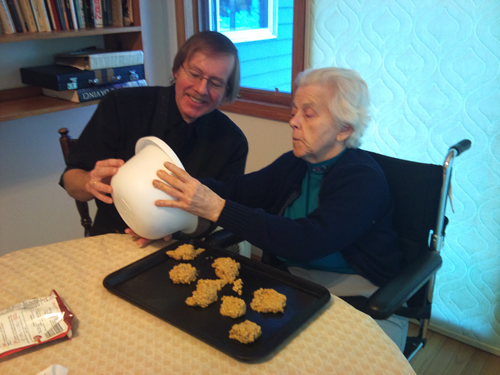What Person Centered Care Should Really Look Like & Why it’s Important

If you ask the staff at any nursing home or retirement facility whether they offer “person centered” dementia care, they will undoubtedly say yes. Person centered care, however, reveals itself differently depending on the organization’s philosophy. It is important to know what genuine and compassionate, person centered care looks like in day-to-day life. Individuals living with progressive, neurological illnesses, such as Alzheimer’s Disease, may benefit from a person centered care approach. It can reduce many unnecessary stresses.
In larger nursing homes, the diagnosis and treatment of the illness often become the caregivers’ focus. Searches for a “cure” or symptom reduction overshadow other concerns. In contrast, the individual is the focus in person centered care. Person centered care asks: who are you, what is your history, what are your interests and who is your family. This information paints a unique picture of the individual requiring care. With a thorough understanding of the person, a comprehensive care plan, potentially including treatment and medication, is developed.
Empowering Those with Dementia
Empowerment is the first step in a person centered care plan. Empowerment recognizes a person’s abilities before looking at their challenges or limitations. By making their abilities a priority, we encourage their development and use. The areas of need receive support. The individual feels empowered, instead of caught in a hierarchy of care receiver and care supporter. When done correctly, it should feel mutually enriching.

Active Listening
Empowering someone with dementia requires active listening. By active listening, one listens to whom the individual is and what their needs are. The approach varies depending on the needs of the individual and their abilities. At The Vicarage, when working with someone who uses language, we converse with them. We speak with them about their needs, seeking ways to empower them to use the abilities they have. If, for instance, they spent their life as a homemaker, we encourage them to assist us with meal preparation or household responsibilities.
When individuals’ abilities, especially language, are more challenged, we utilize other modes of communication. We may rely on family for information, as well as other methods of communication, including eye contact, physical touch, tone, and body language. We patiently observe their communication processes until we understand the feeling behind their voice and actions. When someone is irritated, happy, or angry, it can be expressed without language. Active listening is paramount to compassionate care.
Living in their Reality
Another component of our person centered philosophy is the role of living in residents’ realities. We never challenge what they believe to be true. Rather, we embrace the reality and facilitate daily care through it. It is a gentler approach to caring for an individual living with a dementing illness. If their reality does not agree with ours, we do not try to correct them. We go to where they are psychologically. We don’t try to alter the situation. We accept it and do so on a profound level. We find it can be a way to reduce anxiety.
In other dementia care settings, staff may expend energy keeping residents’ realities aligned with their own. At The Vicarage, our home supports residents’ realities, varied as they may be, while preserving an enriched environment. Our dementia care providers transition from one reality to the next, caring for people within their realities, but managing a culture that is comfortable and safe.
Is it lying if you are living in their reality?
Families often struggle with living in their loved one’s reality, because it feels like lying. In a cultural setting where a person is expected to have a reality that is consistent with those around them, lying is a problem. However, in a setting where you are living with people who have progressive neurological illnesses and who cannot be held accountable in the same manner that someone without dementia would be, it is not lying. It’s a means of caring, a means of reducing potential frustration, confusion and anxiety.
Sundowner’s Syndrome is not uncommon among those living with dementia. A common manifestation of the syndrome revolves around seeking out family members who died. Within their reality, the family member is alive and they need to connect with the loved one. With time, these individuals become increasingly anxious, because they cannot find the person. Staff may be aware that the loved one died many years ago. If such information is shared, it will likely devastate their reality and cause confusion, fear and sadness. If, however, staff gently redirect them by saying that their mother is running late or that she will be here soon, you can see the tension begin to fade and the situation resolves. When the family member is to “arrive,” the individual typically forgets the entire encounter.
Why is this Important?
We cannot try to jolt a person living with dementia back into our reality. If we do, we risk increasing anxiety, stress, confusion, anger, sadness and any other range of negative emotion. If we choose to answer compassionately, living in their reality is an appropriate response.
We can reduce the negative feelings and help the resident to decompress. We are meeting their fears and questions with answers that make sense to them. We are answering positively, gently, calmly. This approach begins to relax that person, they begin to decompress. Without increasing the use of pharmaceuticals, you’ve created a setting where you are caring for that person psychologically and personally in a way that is genuine.
Person centered care takes patience and experience. engaging in this work since 1998, we stand by our philosophy and our passion for what we do and why we exist continues. We fervently hope for cures for dementing illnesses. But until then, we continue to promote person centered dementia care. We see its benefits and the families of those we care for agree!


